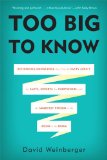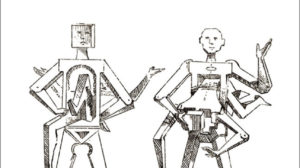
La rete è ovviamente centrale in quello che sta succedendo. Perché la conoscenza non è la somma dei libri che l’umanità ha prodotto e neppure la somma di tutti i testi di ogni genere, non è quello che sta nel nostro cervello e nell’insieme di tutti i cervelli umani: è un insieme ancora più grande che contiene anche le relazioni tra i cervelli, i mezzi che usano per espandere le loro capacità, le dinamiche che generano nuovi pensieri e ricordano quelli già pensati… Un insieme troppo grande per conoscerlo. La rete ha qualcosa a che fare con tutto questo. Anche se va compresa.
Come riassumere il succo del libro meglio di Jeff Jarvis – anch’egli entusiasta del libro di David Weinberger che a sua volta ha commentato la recensione dicendo che contiene le citazioni giuste?
Dice Weinbeger:
«As knowledge becomes networked, the smartest person in the room isn’t the person standing at the front lecturing us, and isn’t the collective wisdom of those in the room. The smartest person in the room is the room itself: the network that joins the people and ideas in the room, and connects to those outside of it. It’s not that the network is becoming a conscious super-brain. Rather, knowledge is becoming inextricable from — literally unthinkable without — the network that enables it. Our task is to learn how to build smart rooms — that is, how to build networks that make us smarter, especially since, when done badly, networks can make us distressingly stupider».
E più avanti:
«Knowledge now lives not just in the skulls of individuals. Our skulls and our institutions are simply not big enough to contain knowledge. Knowledge is now a property of the network, and the network embraces businesses, governments, media, museums, curated collections, and minds in communication.»
Riassume Jarvis:
«Knowledge until now was about creating and controlling scarcity. Up to now, says David, “[w]e’ve managed the fire hose by reducing the flow. We’ve done this through an elaborate system of editorial filters that have prevented most of what’s written from being published . . . Knowledge has been about reducing what we need to know.” But now, of course, information is abundant and only growing — multiplying — as we invent more ways to create and discover and capture and analyze and question. That’s what freaks the old — pardon my choice of word — sphincters of information, the controllers and owners of it. This conflict erupted when Gutenberg invented the printed book and scholars feared we’d end up with too many of them. It emerges again now that Berners-Lee has invented the web.»
E così Jarvis richiama il finale:
«At the end, he examines the characteristics of the net and its knowledge: abundance (“The new abundance makes the old abundance look like scarcity”); links (“Links are subverting not just knowledge as a system of stopping points but also the credentialing mechanism that supported that system”); no need to get permission (“Let anyone publish whatever they want … and the Knowledge Club loses its value”); publicness (somebody ought to write a book about that); and the unresolved nature of questions (“The old enlightenment ideal was far more plausible when what we saw of the nattering world came through filters that hid the vast, disagreeable bulk of disagreement”). “What we have in common,” he concludes, “is not knowledge about which we agree but a shared world about which we will always disagree.”»
Il libro ha generato una quantità di commenti e interpretazioni. Eccone tre:
Evgeny Morozov
Salon
Steven Poole
E poi ci torniamo (questa era una prima segnalazione dovuta all’energia
intellettuale generata dalla lettura; ma quando l’avrò finita ne
riparliamo).






[…] di miliardi di byte). La Media Library Online aiuta a connettere le biblioteche alla rete. David Weinberger insegna che la nuova catalogazione è ampia come il mondo dei […]
[…] e validazione della conoscenza. Il volume è stato già ampiamente recensito anche in Italia (qui, qui e qui ad esempio). Nonostante ciò, credo che la visione sul rapporto tra scienza e media, […]